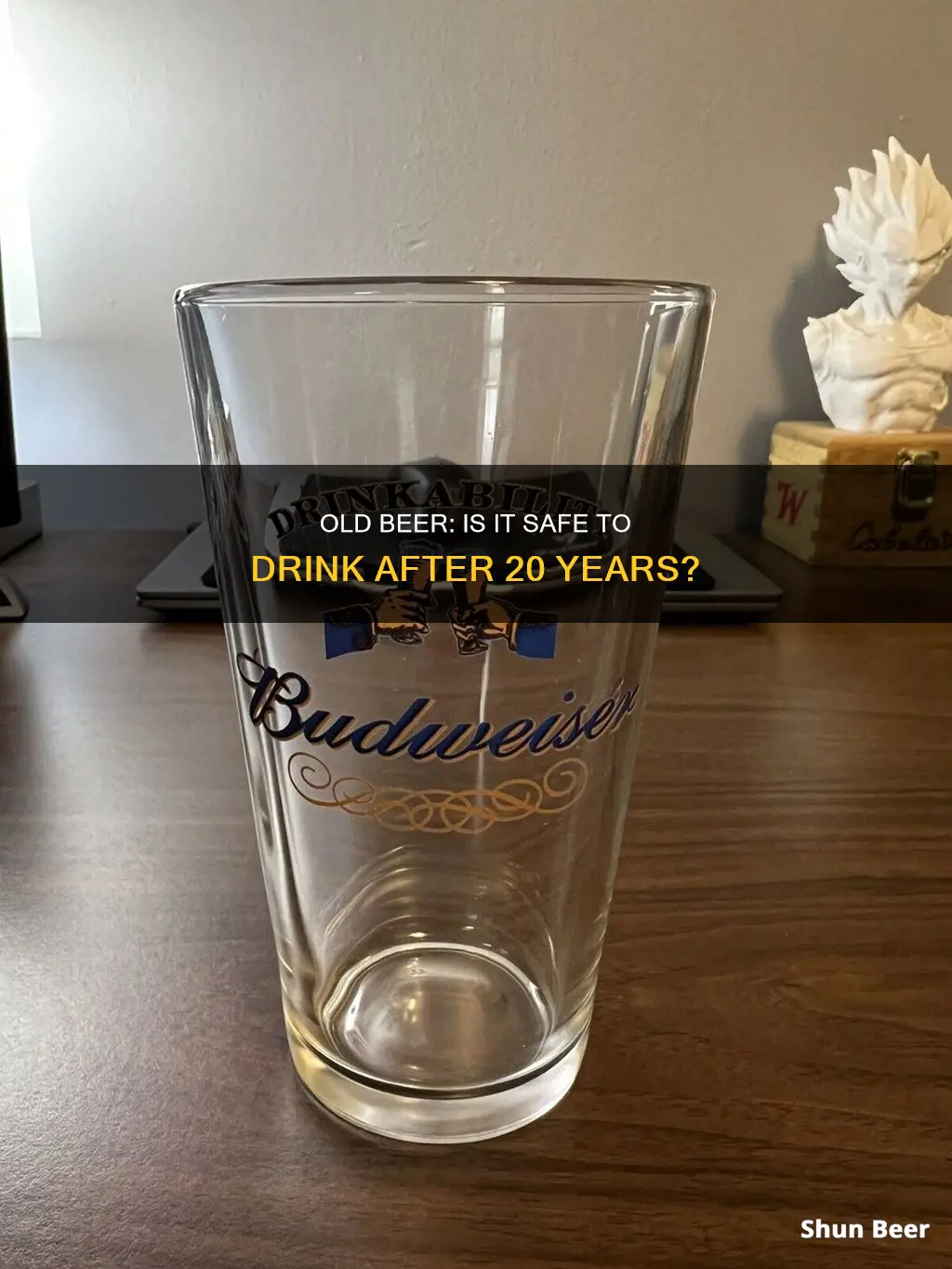
Drinking a 20-year-old beer is unlikely to harm you, but it probably won't taste very nice. Beer is a perishable product that stales when exposed to light, oxygen and heat, which break down its organic compounds. This process can be slowed by refrigeration, but even chilled, a beer will usually only taste good for up to two years.
What You'll Learn

Is drinking 20-year-old beer dangerous?
Drinking a 20-year-old beer is not dangerous for your health, but it is likely to be an unpleasant experience.
According to several sources, drinking expired beer is harmless. As one source explains, "pathogens cannot live in beer, so from a health standpoint, beer cannot go bad". The alcohol content, low pH, and antimicrobial activity of hops all prevent harmful pathogens from growing inside the beer.
However, the taste of the beer will almost certainly be affected. Beer is a perishable product that stales when exposed to light, oxygen, and heat, which degrade the organic compounds that make beer smell and taste good. The longer a beer is stored, the more oxidised it will become, and the more it will taste like cardboard.
One source describes the taste of a 20-year-old beer as "wholly unpleasant", with an aroma of "metal and burnt plastic". Another source says that drinking a 25-year-old beer will be safe but that it will "taste like soggy cardboard and dirty pennies and smell like a wet dog".
To summarise, drinking a 20-year-old beer is not dangerous, but it is unlikely to be a pleasant experience.
Kicking the Beer Habit: Losing Weight and Gaining Health
You may want to see also

How does 20-year-old beer taste?
It's important to note that drinking a 20-year-old beer is harmless. Beer is either pasteurized or filtered to eliminate bacteria, making it extremely resistant to spoiling. However, the flavour of the beer will degrade over time.
The difference in taste between fresh and old beer is quite noticeable. While fresh lager has a bright hops flavour and refreshing bitterness, a year-old bottle is often distinctly malty, sweet, and flat. This difference becomes even more pronounced in beers that are several years old.
The change in taste is due to the oxidation of the aroma and flavour compounds found in hops over time. Certain aromatic compounds increase with prolonged exposure to oxygen, resulting in sweet, sherry-like flavours. The speed of these reactions depends on the alcohol content of the beer and how it's stored. Refrigerating beer slows down the ageing process, so it's best to choose beer that is stored in a cooler rather than on a shelf. Beers with higher alcohol content have a longer shelf life.
Additionally, the type of container can impact the taste of aged beer. Unlike bottled beer, canned beer is airtight, and oxygen is one of the factors that contribute to the degradation of beer flavour over time. Therefore, canned beer is likely to last longer.
Beer Growlers: How Do They Work?
You may want to see also

How to store beer to make it last
Beer is a perishable product that can be safely consumed past its expiration date, although its flavour will degrade over time. To make your beer last longer, there are several factors to consider:
Container
Beer can be packaged in bottles, cans, or kegs. Beer stored in cans is likely to last longer as it is airtight, preventing oxidation. Bottled beer is at a higher risk of oxygen exposure, and it should be stored upright to minimise contact with the air. Kegs should be stored in a cool, dry space, away from other foods, and untapped kegs should be used sooner rather than later.
Temperature
Beer should be stored in a cool place, ideally between 45 and 55 degrees Fahrenheit for packaged beer, and between 10 and 16 degrees Celsius for strong beers such as barley wines and imperial stouts. Refrigeration is always preferable to room temperature as it slows down the aging process, but freezing the beer will likely alter its taste.
Time of Bottling
The bottling date is an important factor in determining how long the beer will last. Beer should be consumed within three to six months of packaging or before its best-by date. Unpasteurised beer should be refrigerated at all times, while beers meant for cellaring, such as imperial stouts and barley wines, should not be refrigerated.
Type of Beer
The variety or style of beer also plays a role in its shelf life. Lighter beers with lower alcohol content, such as pale ales, wheat beers, and lagers, should be consumed within three months of packaging. Heavier beers like stouts and porters have a longer shelf life of about six months. Beers that benefit from longer storage, such as barrel-aged beers, may be candidates for cellaring. However, beer is not like wine, and it should not be left to age for years, as it will eventually go bad.
Light Exposure
Beer should be stored in a dark place, away from direct sunlight and fluorescent light, to prevent skunking or lightstrike, which occurs when light-sensitive hops are exposed to too much light, creating an unpleasant sulphur off-flavour. Brown bottles are preferable to green or clear bottles as they minimise the effects of light strike.
Wine and Beer: Can You Enjoy Both?
You may want to see also

What happens to your body when you drink expired beer?
Drinking expired beer is harmless to your body. It is non-toxic and will not cause sickness. However, the taste and quality of the beer will degrade over time.
Beer is similar to wine in that it continues to age and change even after bottling. Unlike wine, however, beer does not improve with age. The ideal window to drink beer is as close to the packaging date as possible, as this is when it is freshest and has the best flavour.
Several factors contribute to the deterioration of beer over time. Beer contains a small amount of oxygen, and as the aroma and flavour compounds found in hops oxidise, they dissipate or transform, resulting in stale, flat, sweet, or malty flavours. The speed of these reactions depends on the alcohol content of the beer, how it is stored, and exposure to light and heat. Refrigerating beer or storing it in a cool, dark place can slow down the ageing process.
Additionally, the hoppiness of beer can diminish over time, causing the citrusy, floral, or tropical hop aromas to disintegrate. Exposure to ultraviolet light can also cause "skunked" beer, as the chemicals in hops react poorly with light.
While drinking expired beer will not cause any harm to your body, it is unlikely to be an enjoyable experience due to the changes in taste and quality.
Flu Shot and Beer: Is It Safe?
You may want to see also

Is drinking old beer safe?
It is safe to drink old beer, but it may not taste very nice. The consensus is that drinking expired beer is harmless, non-toxic, and will not cause sickness. However, the taste and smell of the beer will likely be affected over time.
Beer is a perishable product that stales when exposed to light, oxygen, and heat, which degrade the organic compounds that make beer smell and taste great. Beer is made from organic plant ingredients that will eventually decay.
How to Store Beer
To slow the process of ageing, beer should be stored in a dark, cool place, preferably in the fridge. Beers stored in the pantry will still taste good for six to nine months, and those stored in the fridge can last up to two years. Beers with higher alcohol content will keep longer.
The flavour of expired beer will depend on the type of beer and how it has been stored. The oxygen in beer can cause it to taste stale, like cardboard or wet cardboard, and the beer may develop sweet, grainy, caramel, and toffee notes. The hoppiness of the beer can also diminish over time, causing the citrusy, floral, or tropical aromas to disintegrate.
Beer After a Workout: Good or Bad Idea?
You may want to see also
Frequently asked questions
Drinking expired beer is harmless. It is pasteurized or filtered to eliminate bacteria, so it is extremely resistant to spoiling.
It will likely taste stale, flat, or like cardboard due to oxidation.
Beer kept in the pantry will still taste good for six to nine months, and a beer in the fridge can last up to two years.
Beer should be stored in a dark, cool place. The ideal temperature depends on the type of beer, but standard beers like IPAs or stouts are usually stored at 50 to 54°F (10 to 12°C), while lighter beers like pilsners and lagers should be stored cooler.
Yes, drinking a 20-year-old beer is safe. It won't make you sick, but it probably won't taste very good.







